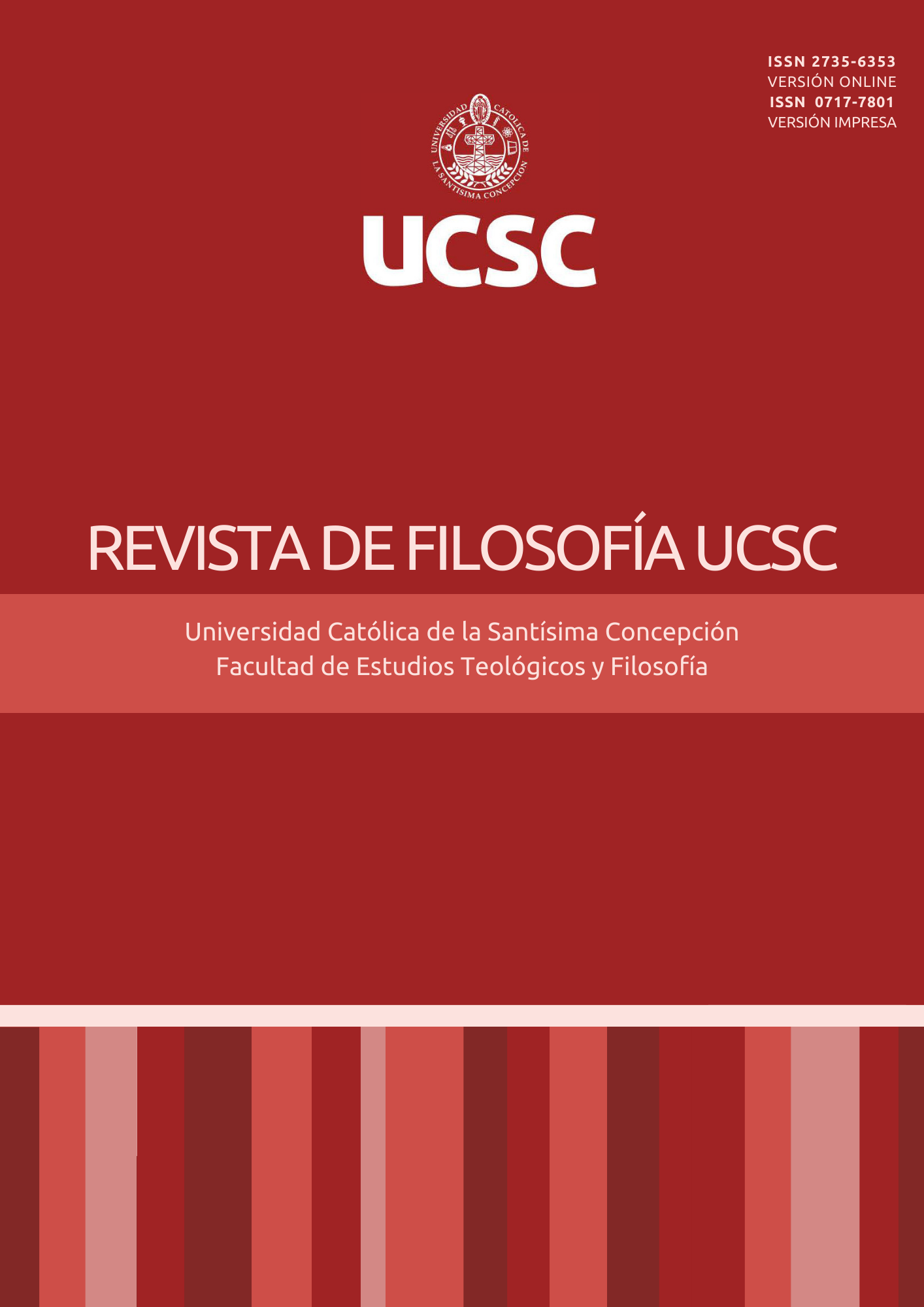El artesano de los nombres: La presencia del Crátilo de Platón en el Idiota. De mente de Nicolás de Cusa a propósito de la imposición de nombres
Contenido principal del artículo
Resumen
Nicolás de Cusa (1401-1464), cuyo pensamiento florece en los umbrales de la Modernidad, se sabe explícitamente heredero de una plural tradición platónica. Con todo, resulta decisiva la presencia de los diálogos de Platón con los que el Cusano tuvo contacto, sea por vía directa o bien indirecta. El propósito de este artículo es estudiar uno de los tópicos centrales de la concepción cusana del lenguaje, esto es, la imposición de nombres a las cosas, a la luz del tratamiento que ofrece en el tercero de los Idiotae libri, el De mente (1450), y evaluar allí la presencia plausible del Crátilo de Platón en su desarrollo. Con ello buscamos ofrecer una clave hermenéutica aún no suficientemente explorada en el ámbito internacional de los estudios sobre el pensamiento de Nicolás de Cusa.
Detalles del artículo
Sección

Esta obra está bajo una licencia internacional Creative Commons Atribución-NoComercial 4.0.
La Revista de Filosofía UCSC es de acceso abierto y no cobra por publicar en ella. Además, regula su política de Derechos de Autor y de acceso a sus archivos de acuerdo con la Licencia Pública Attribution-NonCommercial 4.0 International (CC BY-NC 4.0), por tanto, se permite compartir (reproducir y distribuir el material en cualquier medio o formato) y adaptar (modificar, transformar y crear a partir del material) siempre y cuando se de crédito adecuadamente, se incluya la cita con los datos correspondientes. Además, no está permitido utilizar el material con fines lucrativos.
Cómo citar
Referencias
André, J. M. (2006). Nicolau de Cusa e a força da palavra. Revista Filosófica de Coimbra, 29, 3-38.
Apel, K. O. (1955). Die Idee der Sprachebei Nicolaus von Cues. Archiv für Begriffsgeschichte, 1, 200-221.
Beierwaltes, W. (1987). Das seiendeEine. ZurneuplatonischenInterpretationderzweitenHypothesis des platonischenParmenides: Das BeispielCusanus. En G. Boss & G. Seel (Eds.), Proclus et son influence. Actes du Colloque de Neuchâtel (pp. 287-297).
Brunner, F. (1997). Le néoplatonismeaumoyenâge (1986). En Métaphysiqued’IbnGabirol et de la traditionplatonicienne (VariorumCollectedStudies Series). Ashgate.
Colomer, E. (1975). De la Edad Media al Renacimiento: VI. Nicolás de Cusa, un pensador en la frontera de dos mundos. Herder.
Cusa, N. (1932). De docta ignorantia (H I, ed. R. Klibansky et E. Hoffmann). Lipsiae.
Cusa, N. (1937). Idiota. De mente (H V, ed. L. Baur, alteramcuravit R. Steiger, 1983). Hamburgi.
Cusa, N. (1959). De genesi (H IV, ed. P. Wilpert). Hamburgi.
Cusa, N. (1964). Compendium (H XI/3, ed. B. Decker et K. Bormann). Hamburgi.
Cusa, N. (1972). De coniecturis (H III, ed. J. Kock, C. Bormann et J. G. Senger comite). Hamburgi.
Cusa, N. (1982). De venationesapientiae (H XII, ed. R. Klibansky et J. G. Senger). Hamburgi.
Cusa, N. (2004). XVIII Sermones III (1452-1455), Fasc. 4: Sermones CLXXVI-CXCII (H XVIII/4, ed. S. Donati, H. Schwaetzer, F. Stammkötter). Hamburgi.
Cusa, N. (2005), Un ignorante discurre acerca de la mente. Biblos.
D’Amico, C. (2019). Plato and the Platonic tradition in the philosophy of Nicholas of Cusa. En A. Kim (Ed.), Brill’sCompanionto German Platonism, Brill DOI: https://doi.org/10.1163/9789004285163_003
De Libera, A. (1996). La querelle des universaux. De Platon à la fin du Moyen Age. Éditions du Seuil.
Duclow, D. (1997). The analogy of the word: Nicholas of Cusa’s theory of language. Bijdragen, 38, 282-299. DOI: https://doi.org/10.1080/00062278.1977.10597149
Eco, U. (1987). La línea y el laberinto: Las estructuras del pensamiento latino. Vuelta Sudamericana, 1(9), 7-24.
Flasch, K. (1973). Die Metaphysik des Einen bei Nikolaus von Kues. ProblemgeschichtlicheStellung und systematischeBedeutung. Brill. DOI: https://doi.org/10.1163/9789004451803
Flasch, K. (1998). Nikolaus von Kues. GeschichteeinerEntwicklung. Vittorio Klostermann.
Gadamer, H.-G. (1960). Wahrheit und Methode: GrundzügeeinerphilosophischenHermeneutik. J.C.B. Mohr (Paul Siebeck).
Gandillac, M. de. (1982). Neoplatonism and Christian thought in the fifteenth century (Nicholas of Cusa and Marsilio Ficino). En R. O’Meara (Ed.), Neoplatonism and Christian thought (pp. 143-168), State University of New York Press. DOI: https://doi.org/10.2307/jj.18255107.16
Klein, W.-P. (1992). Am Anfang war das Wort. Theorie- und wissenschafts-geschichtlicheElementefrühneuzeitlichenSprachbewusstseins. Akademie Verlag.
Klibansky, R. (1943). Plato's Parmenides in the Middle Ages and the Renaissance. Mediaeval and Renaissance Studies, 1(1), Ulan Press
Koch, J. (1956/7). Augustinischer und dionysischerNeuplatonismus und das Mittelalter. Kant Studien, 48(2), 117-133. DOI: https://doi.org/10.1515/kant.1957.48.1-4.117
Hoye, N. (1986). The meaning of neoplatonism in the thought of Nicholas of Cusa. Dow. Rev., 104, 10-18. DOI: https://doi.org/10.1177/001258068610435402
Meinhardts, H. (1979). Exaktheit und Mutmassungscharakter der Erkenntnis. En K. Jacobi (Ed.), Nikolaus von Kues: Einführung in sein philosophisches Denken (pp. 101-120). Alber.
Marx, J. (1905). Verzeichnis der Handschriften-Sammlung des Hospitals zu Cues beiBernkastel a./Mosel. Selbstverlag des Hospitals.
Platón. (1931). Cratyle (L. Méridier, Ed. y Trad.). Les Belles Lettres.
Platón. (1988). Crátilo (U. Schmidt Osmanczik, Intro., Versión y Notas). Universidad Nacional Autónoma de México.
Platón. (1992). Crátilo (J. Calvo, Intro., Trad. y Notas). Gredos.
Platón. (2006). Crátilo (C. Mársico, Trad., Intro. y Notas). Losada.
Platón. (1900-1907). Opera (I. Burnet, Ed.). Oxonii.
Riccati, C. (1993). La presencia de Proclo entre neoplatonismo arabizante y tradición dionisiana (Bertoldo de Moosburg y NiccolòCusano). En G. Piaia (Ed.), Concordia Discors. Studi su NiccolòCusano e l’umanesimo europeo offerti a Giovanni Santinello (pp. 23-39). EditriceAntenore.
Santinello, G. (1987). Introduzione a NiccolòCusano. Laterza.
Senger, H. G. (1979). Die Sprache der Metaphysik. En K. Jacobi (Ed.), Nikolaus von Kues: Einführung in sein philosophisches Denken (pp. 74-100). Alber.
Senger, H. G. (1986). Aristotelismus versus Platonismus. Zur Konkurrenz von zweiArchetypen der Philosophie imSpätmittelalter. En Aristotelisches Erbe imarabisch-lateinischenMittelalter (pp. 53-80), De Gruyter DOI: https://doi.org/10.1515/9783110858969.53
Soulez, A. (1991). La grammairephilosophique chez Platon. PUF. DOI: https://doi.org/10.3917/puf.soule.1991.01
Vansteenberghe, E. (1920). Le cardinal Nicolas de Cues (1401-1464). L’action – la pensée. Imprimerie Lefebvre-Ducrocq.




